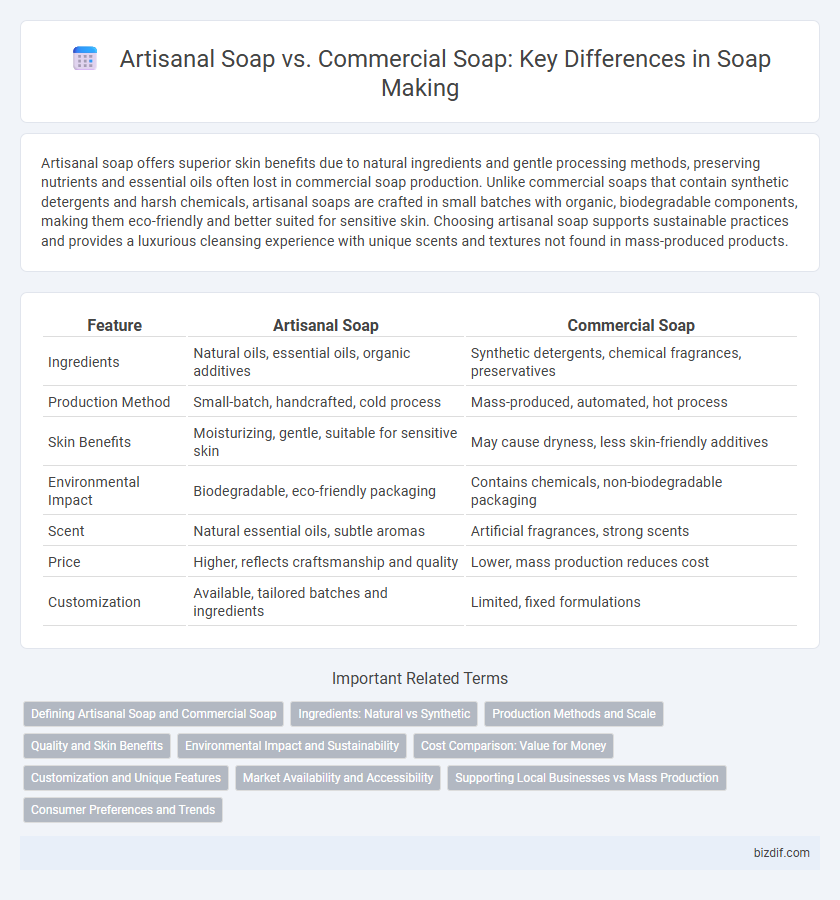Artisanal soap offers superior skin benefits due to natural ingredients and gentle processing methods, preserving nutrients and essential oils often lost in commercial soap production. Unlike commercial soaps that contain synthetic detergents and harsh chemicals, artisanal soaps are crafted in small batches with organic, biodegradable components, making them eco-friendly and better suited for sensitive skin. Choosing artisanal soap supports sustainable practices and provides a luxurious cleansing experience with unique scents and textures not found in mass-produced products.
Table of Comparison
| Feature | Artisanal Soap | Commercial Soap |
|---|---|---|
| Ingredients | Natural oils, essential oils, organic additives | Synthetic detergents, chemical fragrances, preservatives |
| Production Method | Small-batch, handcrafted, cold process | Mass-produced, automated, hot process |
| Skin Benefits | Moisturizing, gentle, suitable for sensitive skin | May cause dryness, less skin-friendly additives |
| Environmental Impact | Biodegradable, eco-friendly packaging | Contains chemicals, non-biodegradable packaging |
| Scent | Natural essential oils, subtle aromas | Artificial fragrances, strong scents |
| Price | Higher, reflects craftsmanship and quality | Lower, mass production reduces cost |
| Customization | Available, tailored batches and ingredients | Limited, fixed formulations |
Defining Artisanal Soap and Commercial Soap
Artisanal soap is handcrafted using traditional methods and natural ingredients, often incorporating essential oils and botanicals for unique scents and skin benefits. Commercial soap is mass-produced through chemical processing, typically containing synthetic detergents, fragrances, and preservatives aimed at cost efficiency and shelf stability. The distinction lies in artisanal soap's emphasis on quality, customization, and skin-friendliness versus commercial soap's focus on mass production and uniformity.
Ingredients: Natural vs Synthetic
Artisanal soap typically contains natural ingredients such as plant-based oils, essential oils, and botanicals, which provide moisturizing and therapeutic benefits without harsh chemicals. In contrast, commercial soap often relies on synthetic detergents, artificial fragrances, and preservatives that can strip the skin of its natural oils and cause irritation. The natural composition of artisanal soap supports skin health and environmental sustainability, whereas commercial soap emphasizes mass production and cost efficiency over ingredient quality.
Production Methods and Scale
Artisanal soap is crafted in small batches using traditional cold process or hot process methods, emphasizing natural ingredients and hand-mixing techniques that preserve glycerin and enhance skin benefits. Commercial soap production relies on large-scale, continuous processes such as the melt-and-pour or soap extrusion methods, prioritizing cost efficiency and uniformity over ingredient quality. This scalable automation often involves synthetic additives and detergents, contrasting with the personalized craftsmanship and minimal processing found in artisanal soap.
Quality and Skin Benefits
Artisanal soap is crafted using natural ingredients such as essential oils, plant-based fats, and glycerin, which retain moisturizing properties, enhancing skin hydration and reducing irritation. Commercial soap often contains synthetic detergents and harsh chemicals that can strip natural oils, leading to dryness and sensitivity in the skin. The higher quality of artisanal soap supports better skin health through gentle cleansing and nourishing effects, making it a preferred choice for sensitive or dry skin types.
Environmental Impact and Sustainability
Artisanal soap often utilizes natural, biodegradable ingredients such as plant-based oils and essential oils, minimizing environmental pollution and supporting sustainable agriculture, whereas commercial soap frequently contains synthetic chemicals and preservatives that can harm aquatic ecosystems and contribute to pollution. Small-batch artisanal production reduces carbon footprints through localized sourcing and minimal packaging, contrasting with commercial soap's mass production, which typically involves high energy consumption and plastic waste. Choosing artisanal soap aligns with eco-conscious consumer trends, promoting biodegradability, renewable resources, and reduced environmental toxin release.
Cost Comparison: Value for Money
Artisanal soap typically costs more upfront due to handcrafted ingredients and smaller production scales, but it offers superior skin benefits, natural components, and unique scents that enhance long-term value for money. Commercial soap, priced lower due to mass production and synthetic additives, might save money initially but often lacks moisturizing properties and contains harsh chemicals that can lead to skin irritation. Investing in artisanal soap promotes healthier skin and environmental sustainability, providing better cost-effectiveness over time despite a higher initial price.
Customization and Unique Features
Artisanal soap offers extensive customization with natural ingredients, personalized scents, and varied textures tailored to individual skin types, unlike commercial soap which often contains standardized formulas and synthetic additives. Unique features of artisanal soap include handmade techniques, organic oils, and essential oils that enhance skin nourishment and reduce chemical exposure. Consumers seeking bespoke skincare solutions prefer artisanal soap for its authenticity and ability to address specific dermatological needs.
Market Availability and Accessibility
Artisanal soap is typically available in specialty stores, farmers' markets, and online platforms, catering to niche markets seeking natural and unique ingredients. Commercial soap dominates supermarkets, drugstores, and large retailers, ensuring widespread availability and affordability for everyday consumers. The accessibility of commercial soap is enhanced by mass production and extensive distribution networks, while artisanal soap relies on limited production and targeted sales channels.
Supporting Local Businesses vs Mass Production
Artisanal soap handcrafted by local businesses often uses natural, high-quality ingredients and traditional methods, promoting small-scale economies and sustainable practices. Commercial soap is mass-produced in factories with standardized formulas prioritizing cost efficiency and wide distribution, often relying on synthetic additives. Supporting artisanal soap helps sustain local artisans and reduces environmental impact compared to the industrial scale of commercial soap production.
Consumer Preferences and Trends
Consumer preferences increasingly favor artisanal soap due to its natural ingredients, unique scents, and eco-friendly production methods, reflecting a growing trend towards sustainability and skin health. Commercial soap remains popular for its affordability, mass-produced consistency, and widespread availability, appealing to budget-conscious buyers. Market trends show a rise in demand for customizable and organic soap options, driving artisanal brands to innovate and expand their product lines.
Artisanal Soap vs Commercial Soap Infographic

 bizdif.com
bizdif.com